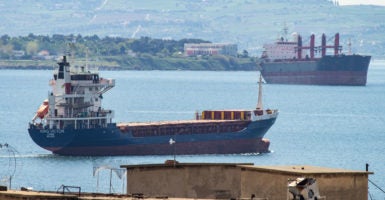Things cost more in Alaska. A very expensive reason why is the century-old law known as the Jones Act.
Section 27 of the act—named for Sen. Wesley Jones, R-Wash., who served in the Senate in the early part of the 20th century—requires that ships transporting goods between U.S. ports must be at least 75% U.S.-owned, at least 75% U.S. crewed, and assembled in the U.S. of components almost entirely fabricated in the U.S.
Among the many inefficiencies caused by the act—also known as the Merchant Marine Act of 1920—is that it drives up the price of shipped goods between U.S. ports.
There are few seaworthy ships that adhere to the rules of the Jones Act and those that do are expensive to build and to operate.
The daily operating cost of crew, tools, supplies, maintenance and repair, insurance, and overhead of operating a Jones Act-compliant, U.S.-flagged ship was calculated as being $20,053 per day in 2010, compared with only $7,454 for the foreign-flagged vessels that are prohibited from transporting goods between U.S. ports due to the Jones Act.
As a consequence, goods and produce shipped on Jones Act vessels are pricier.
Or, goods travel by truck, air, or rail; snarl traffic; waste resources; and increase pollution.
Or, buyers look outside the United States for their goods so they don’t have to use Jones Act vessels—like when Virginia and Maryland bought rock salt used for treating icy roads in winter from Chile instead of Louisiana.
The Jones Act is a typical example of political cronyism at work in perverting economic policy: A small group of people lobby extensively to receive a government economic benefit whose cost is spread widely over the entire population.
The hope is that the overall population won’t notice the pennies being plucked from their pockets to enrich the politically connected beneficiaries.
In this case, the small group includes the dwindling number of domestic shipyards in the U.S. and some labor unions. The larger group includes everyone shopping for something at a grocery store.
Grocery items in the four Alaskan cities of Juneau, Kodiak, Fairbanks, and Anchorage, average more than 38% more expensive than in the average U.S. city, in large part due to the state’s dependence on maritime transportation having to comply with the Jones Act.
The transportation of crude oil and natural gas from U.S. port to U.S. port is also more expensive as a result of the Jones Act.
President Donald Trump was recently rumored to be considering relaxing some Jones Act requirements to more cost effectively ship natural gas by ship in the U.S.
Sen. Bill Cassidy, R-La., threw a wet blanket on that idea when he announced after meeting with Trump that no waivers to the law are imminent.
The president’s apparent change of heart may be due in part to the advocacy for the Jones Act at the meeting by Alaska’s two Republican senators, Dan Sullivan and Lisa Murkowski.
Why would Alaska’s senators be arguing in favor of a law that so clearly raises costs for their constituents? For whatever reason, the vested interests of the sea transport industry have won the day in the competition for the senators’ ears.































